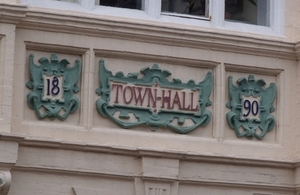New local audit steps move £1.2 billion savings closer
Local Government Association to lead interim arrangements for public sector audit after 2015.

town hall
Local Government Minister Brandon Lewis announced today (21 March 2014) that as part of plans to save £1.2 billion from the abolition of the Audit Commission the Local Government Association (LGA) will lead interim arrangements for public sector audit after 2015.
The Local Government Association will set up a new company to take on responsibility for management of the Audit Commission’s contracts until the legal introduction of local appointment in 2017.
The government abolished the Audit Commission’s expensive inspection regime and, in 2012, its audit practice was outsourced to private audit firms. The Local Audit and Accountability Act 2014 will disband the residual Audit Commission and introduce a new local audit framework.
The decision to close the Audit Commission has already led to savings of over £400 million. The transitional body is providing a step further towards achieving savings to the taxpayer of £1.2 billion over 10 years.
In addition, ministers have asked experts at the Chartered Institute of Public Finance and Accountancy (CIPFA) to develop the Audit Commission’s counter-fraud measures in a new national Counter Fraud Centre.
Ministers believe that this new centre can be part of the next generation of activity to ensure local authorities can access information to help them proactively prevent and prosecute local fraud.
Local Government Minister Brandon Lewis said:
Today’s decisions mark an important step towards greater localism and our audit reforms that will save £1.2 billion. The Local Government Association will play a key role in getting arrangements in place to pave the way for the new local audit regime that passes power down through more local choice and transparency. This will leave more time for councils to get on with the business of local government.
Chairman of the Local Government Association Sir Merrick Cockell said:
Placing the LGA at the heart of this process will help ensure that high quality audit continues to be delivered with stable audit fees. We are pleased that government has recognised the unique strengths of the LGA which make it ideally suited to set up the transitional body.
It is our aim that councils that wish to do so will have the opportunity to access external audit from a national body when the current contracts come to end. We believe that this will continue to provide the public sector nationally with the best prices for external audit.
Chief Executive of Chartered Institute of Public Finance and Accountancy Rob Whiteman said:
Tackling fraud and protecting the public purse are at the heart of public concerns about the way government spends taxpayer’s money. It is fantastic news that the Audit Commission will be able to transfer their current work on fighting fraud to CIPFA’s new Counter Fraud Centre.
The new centre will be a global leader in protecting public resources from fraud. It will fight to make sure that every penny of public money is accounted for and spent on the services that communities need.
Further information
Outsourcing all the Audit Commission’s in-house local public audit work to the private sector has lead to a 40% reduction in council audit fees and left only a small residual Commission staff to oversee the outsourced contracts until the Commission closure is completed and the contracts transferred.
The Local Government Association will be responsible for managing the Commission’s £85 million audit contracts as well as the value for money profiles when it closes at the end of March 2015. It will also have responsibility for working with the Department for Work and Pensions to enable the continued delivery of the Housing Benefit count.
The Local Audit and Accountability Act 2014 delivers the government’s commitment to close the Audit Commission and transfer its remaining functions. The Act puts in place a new local audit and accountability framework for local public bodies in England. This replaces the centralised arrangements for the audit of local bodies with a more localist approach, giving local bodies the freedom to appoint their own auditors from an open and competitive market; manage their own audit arrangements, with appropriate safeguards to ensure auditor independence; and retain the same high audit standards. As a result, audit services will be better matched to local bodies’ individual needs.
The Act also protects the rights of taxpayers to inspect local bodies’ accounts and allows them to say if they think there are matters that the auditor should examine. In addition, the Bill maintains public interest reports and we intend that the new regime should safeguard whistleblowing protections through secondary legislation.
A plain English guide to the Local Audit and Accountability Act is available.
Savings of up to £1.2 billion from the abolition of the Audit Commission are over a 10 year period and include savings made by local authorities on external audit fees. An impact asssessment quantifies the costs and savings associated with the government’s programme of reforms to local audit set out in the Act.
Office address and general enquiries
2 Marsham StreetLondon
SW1P 4DF
Contact form https://www.gov.uk/gui...
General enquiries: please use this number if you are a member of the public 030 3444 0000
If your enquiry is related to COVID-19 please check our guidance page first before you contact us - https://www.gov.uk/guidance/coronavirus-covid-19-guidance-for-local-government.
If you still need to contact us please use the contact form above to get in touch, because of coronavirus (COVID-19). If you send it by post it will not receive a reply within normal timescale.
Media enquiries
Email newsdesk@communities.gov.uk
Please use this number if you are a journalist wishing to speak to Press Office 0303 444 1209